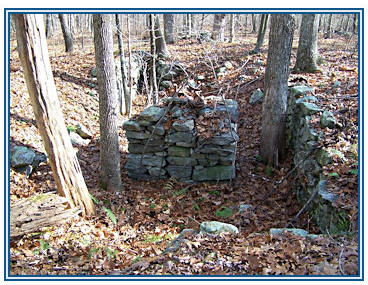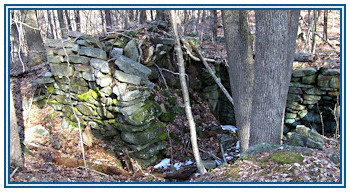NEW ENGLAND CELLAR HOLE HUNTING 101

del (Dan L.)
Hello my fellow enthusiasts! In today's hobby there are many different genres of metal detecting, and almost as many specialized detectors to fill each niche. Beach combing, tot lot hunting, coin or nugget shooting, cache searching, meteorite detecting, and relic hunting are a few of these specific areas. My favorite type is that which I mentioned last -- relic hunting -- and I have been very actively pursuing it for almost ten years now, having logged thousands of hours detecting. During that time I have recovered many old coins and relics of all kinds while enjoying this hobby. I've had the pleasure to detect with a wide variety of good people and have even introduced relic or cellar hunting to a few that have really enjoyed it and even got hooked; still others just didn't like it and it wasn't for them.
Most people just assume from my finds or pictures and forum posts that this is a very easy and always productive type of detecting. The real truth is that relic hunting can be a lot of hard work with sometimes very few rewards. If you are the type of person who expects lots of great-sounding targets and an abundance of coins and relics, you may be disappointed -- the real truth is that you're likely to come home with few old items, but plenty of modern trash like shotgun and rifle shells, junk scraps of iron, modern deer slugs or bullets, and beer cans. You see, many of these places were used in the late nineteenth or early twentieth centuries as dumping grounds for people's trash. If you like history, or very old coins and items that no one has touched in at least a hundred years or more -- and you are blessed with a lot of patience and you enjoy long hikes in the wilderness -- then you might really like cellar or relic hunting in New England. Locating cellar sites is really not the difficult part, but finding one that hasn't already been heavily detected is rare and a challenge. But when you do, it can really produce some great items, and a good number of them too.

Play It Safe
Most beginners starting out don't consider the dangers that can be present in the sometimes remote areas of cellar detecting. Having a detecting buddy when searching these areas can be entertaining, but more important is the fact that someone is there with you. Let's be realistic for a moment... there are dangers that exist while out in the woods, and sometimes you might be miles away from the nearest road or even another person. These dangers take the form of many things, such as uncovered open wells that plummet ten to forty feet straight down. These wells are sometimes covered with just small branches or chicken wire, but this really only makes them harder to see and more dangerous once the newly fallen leaves cover the whole thing. So stay clear of any shallow circular depressions in the ground. I have also witnessed falling branches and even falling trees, especially after a good rain, that could definitely put someone in the hospital. There are small critters and wild animals like bears, bobcat, moose, and even snakes that have surprised me out in the woods. Also, just dressing wrong for the season can be a hazard; blaze orange is a must when out during hunting season, and wearing either bug repellent or specialized clothes to help keep the ticks and mosquitoes off is important. And let's not forget accidents like spraining your ankle or breaking a bone while slipping on rocks. The possiblities are almost endless. It sure would be great to have someone around to go get help or to give you some, because we all know you may not get cell phone service way out there. I cannot stress enough to someone new who wants to get into this type of detecting environment, that they should first tag along with someone, or a few people, with experience just to learn a few basic rules and get an idea what to look out for. And let's face it... we all could use a few helpful tips when trying something new.

Go Prepared
Let's talk about some of the equipment you might want to carry with you. Remember that you're hiking into the woods possibly for miles, so you want to travel as light as possible while still bringing the essentials. A sturdy belt with a few good-sized pouches can carry things like water, a snack, an extra battery pack, a GPS or compass, and something to hold your finds and your trash too. Mine will also hold a pinpointer and a small extra digging trowel. Also it has a spot to hang my relic shovel for when I get tired of holding it, as well as a few band-aids and a good-sized knife. A hat is important to wear, maybe one with a bug-net to keep the pests away. A sturdy pair of hiking boots is essential. Also, gloves are very important, because when digging at these sites you will come across rusty sharp pieces of metal and jagged bits of glass while recovering a nice coin or relic.

Be observant
Cellars come in all kinds of shapes and sizes, and are not really obvious to the untrained eye of someone new to the environment. I've walked by many and didn't even know they were there when I started out. With some time and practice anyone can be proficient in locating and detecting cellar foundations... it just takes some common sense and a lot of patience... and a little luck is always nice too.
|